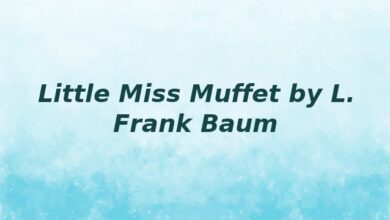
T.S. Arthur – Not at Home
Jonas Bebee has one merit, if he possesses no other, and that is, the merit of being able to make himself completely at home with all his friends, male or female, high or low, rich or poor, under any and all circumstances. His good opinion of himself leaves no room for his imagination to conceive the idea, that possibly there may be, in his character, certain peculiarities not agreeable to all. It never occurs to him, that he may chance to make a mal apropos visit, nor that the prolongation of a call may be a serious annoyance; for he is so entirely satisfied with himself that he is sure every one else must feel his presence as a kind of sunshine.
Of course, such being the character of Mr. Jonas Bebee, it may readily be inferred that he is very likely to commit an occasional mistake, and blunder, though unconsciously, into the commission of acts most terribly annoying to others. His evening calls upon ladies generally produce a marked effect upon those specially selected for the favor. The character of the effect will appear in the following little scene, which we briefly sketch–
“Gentleman in the parlor,” says a servant coming into a room where two or three young ladies sit sewing or reading.
“Who is he?” is the natural inquiry.
“Mr. Bebee.”
“Goodness!”
“Say we are not at home, Kitty.”
“No–no, Kitty, you mustn’t say that,” interposes one. “Tell him the ladies will be down in a little while.”
Kitty accordingly retires.
“I’m not going down,” says one, more self willed and independent than the rest.
You’ve as much right to be annoyed with him as we have,” is replied to this.
“I don’t care.”
“I wish he’d stay away from here. Nobody wants him.”
“He’s after you, Aggy.”
“After me!” replied Agnes. “Goodness knows I don’t want him. I hate the very sight of him!”
“It’s no use fretting ourselves over the annoyance, we’ve got to endure it,” says one of the young ladies. “So, come, let’s put on the best face possible.”
“You can go, Cara, if you choose, but I’m in no hurry; nor will he be in any haste to go. Say to him that I’ll be along in the course of half an hour.”
“No, you must all make your own apologies.”
In the meantime Mr. Bebee patiently awaits the arrival of the ladies, who make their appearance, one after the other, some time during the next half hour. He compliments them, asks them to sing and play, and leads the conversation until towards eleven o’clock, when he retires in the best possible humor with himself and the interesting young ladies favored with his presence. He has not even a distant suspicion of the real truth, that his visit was considered an almost unendurable infliction.
Mr. Bebee’s morning calls are often more unwelcome. He walks in, as a matter of course, takes his seat in the parlor, and sends up his name by the servant. If told that the lady is not at home, a suspicion that it may not be so does not cross his mind; for he cannot imagine it possible that any one would make such an excuse in order to avoid seeing him. Should the lady not be willing to utter an untruth, nor feel independent enough to send word that she is engaged, an hour’s waste of time, at least, must be her penalty; for Mr. Bebee’s morning calls are never of shorter duration. He knows, as well as any one, that visits of politeness should be brief; but he is on such familiar terms with all his friends, that he can waive all ceremony–and he generally does so, making himself “at home,” as he says, wherever he goes.
One day Mr. Jonas Bebee recollected that he had not called upon a certain Mrs. Fairview, for some weeks; and as the lady was, like most of his acquaintances, a particular friend, he felt that he was neglecting her. So he started forth to make her a call.
It was Saturday, and Mrs. Fairview, after having been, for the greater part of the morning, in the kitchen making cake, came up to the parlor to dust and re-arrange some of the articles there a little more to her liking. Her hair was in papers, and her morning wrapper not in a very elegant condition, having suffered a little during the cake-making process. It was twelve o’clock, and Mrs. Fairview was about leaving the parlor, when some one rung the bell. Gliding noiselessly to the window, she obtained a view of Mr. Bebee.
“O, dear!” she sighed, “am I to have this infliction to-day? But it’s no use; I won’t see him!”
By this time the servant was moving along the passage towards the door.
“Hannah!” called the lady, in a whisper, beckoning at the same time with her hand.
Hannah came into the parlor.
“Say I’m not at home, Hannah.”
“Yes, ma’am,” replied the girl, who proceeded on towards the street door, while Mrs. Fairview remained in the parlor.
“Is Mrs. Fairview in?” the latter heard the visitor ask.
“No, sir,” replied Hannah.
“Not in?”
“No, sir. She’s gone out.”
By this time Mr. Bebee stood within the vestibule.
“O, well; I reckon I’ll just drop in and wait awhile. No doubt she’ll be home, soon.”
“I don’t think she will return before two o’clock,” said Hannah, knowing that her mistress, looking more like a scarecrow than a genteel lady, was still in the parlor, and seeing that the visiter was disposed to pass her by and make himself a temporary occupant of the same room.
“No matter,” returned the gentleman, “I’ll just step in for a little while and enjoy myself by the parlor fire. It’s a bitter cold day–perhaps she will be home sooner.”
“O, no, sir. She told me that she would not come back until dinner-time,” said the anxious Hannah, who fully appreciated the dilemma in which her mistress would find herself, should Mr. Bebee make his way into the parlor.
“It’s no consequence. You can just say to her, if she does not return while I am here, that I called and made myself at home for half an hour or so.” And with this, Mr. Bebee passed by the girl, and made his way towards the parlor.
In despair, Hannah ran back to her place in the kitchen, wondering what her mistress would say or do when Mr. Bebee found that she was at home–and, moreover, in such a plight!
In the meantime, Mrs. Fairview, who had been eagerly listening to what passed between Hannah and the visiter, finding that he was about invading her parlor, and seeing no way of escape, retreated into a little room, or office, built off from and communicating only with the parlor. As she entered this room and shut the door, the cold air penetrated her garments and sent a chill through her frame. There was no carpet on the floor of this little box of a place, and it contained neither sofa, chair, nor anything else to sit upon. Moreover, it had but a single door, and that one led into the parlor. Escape, therefore, was cut off, entirely; and to remain long where she was could not be done except at the risk of taking a severe cold.
Through the openings in a Venitian blind that was hung against the glass door, Mrs. Fairview saw the self-satisfied Mr. Bebee draw up the large cushioned chair before the grate, and with a book in his hand, seat himself comfortably and begin to make himself entirely “at home.” The prospect was, that he would thus remain “at home,” for at least the next half hour, if not longer. What was she to do? The thermometer was almost down to zero, and she was dressed for a temperature of seventy.
“I shall catch my death a cold,” she sighed, as the chilly air penetrated her garments, and sent a shudder through her frame.
Comfortably, and as much at home as if he were in his own parlor, sat Mr. Bebee in front of the roaring grate, rocking himself in the great arm-chair, and enjoying a new book which he had found upon the table.
As Mrs. Fairview looked at him, and saw the complete repose and satisfaction of his manner, she began to feel in utter despair. Already her teeth were beginning to chatter, and she was shivering as if attacked by a fit of ague. Five, ten, fifteen, twenty minutes elapsed–but there sat the visiter, deeply absorbed in his book; and there stood the unfortunate lady who was “not at home,” so benumbed with cold as almost to have lost the sense of bodily feeling. A certain feeling in the throat warned her that she was taking cold, and would, in all probability, suffer from inflammation of the windpipe and chest. Five, ten, fifteen minutes more went by; but Mr. Beebe did not move from his place. He was far too comfortable to think of that.
At last after remaining in prison for nearly an hour, Mrs. Fairview, who by this time was beginning to suffer, besides excessive fatigue, from a sharp pain through her breast to her left shoulder blade, and who was painfully aware that she had taken a cold that would, in all probability, put her in bed for a week, determined to make her escape at all hazards. Mr. Beebe showed no disposition to go, and might remain for an hour longer. Throwing an apron over her head and face, she softly opened the door, and gliding past her visiter, escaped into the hall, and ran panting up stairs. Mr. Beebe raised his head at this unexpected invasion of the parlor, but on reflection concluded that the person who so suddenly appeared and disappeared was merely a servant in the family.
About an hour afterwards, finding that Mrs. Fairview did not return, Mr. Beebe left his card on the table, and departed in his usual comfortable state of mind.
Poor Mrs. Fairview paid dearly for her part in this transaction. A severe attack of inflammation of the lungs followed, which came near resulting in death. It was nearly three weeks before she was able to leave her room, and then her physician said she must not venture out before the mild weather of the opening spring.
A few days after the lady was able to go about the house again, Mr. Bebee called to congratulate her on her recovery. Two of her children were in the parlor; one eleven years old, and the other a child in her fourth year.
“O, you naughty man, you!” exclaimed the latter, the moment she saw Mr. Bebee. The oldest of the two children, who understood in a moment what her little sister meant, whispered: “H-u-s-h!–h-u-s-h! Mary!”
“What am I naughty about, my little sis?” said Mr. Bebee.
“O, because you are a naughty man! You made my mother sick, so you did! And mother says she never wants to look in your face again. You are a naughty man!”
“Mary! Mary! Hush! hush!” exclaimed the elder sister, trying to stop the child.
“Made your mother sick?” said Mr. Bebee. “How did I do that?”
“Why, you shut her up in that little room there, all in the cold, when you were here and staid so long, one day. And it made her sick–so it did.”
“Shut her up in that room! what does the child mean?” said Mr. Bebee, speaking to the elder sister.
“Mary! Mary! I’m ashamed of you. Come away!” was the only response made to this.
Mr. Bebee was puzzled. He asked himself as to the meaning of this strange language. All at once, he remembered that after he had been sitting in the parlor for an hour, on the occasion referred to, some one had come out of the little room referred to by the child, and swept past him almost as quick as a flash. But it had never once occurred to him that this was the lady he had called to visit, who, according to the servant, was not at home.
“I didn’t shut your mother up in that room, Mary,” said he, to the child.
“O, but you did. And she got cold, and almost died.”
At this the elder sister, finding that she could do nothing with little Mary, escaped from the parlor, and running up stairs, made a report to her mother of what was going on below.
“Mercy!” exclaimed the lady, in painful surprise.
“She told him that you said you never wanted to look upon his face again,” said the little girl.
“She did!”
“Yes. And she is telling him a great deal more. I tried my best to make her stop, but couldn’t.”
“Rachel! Go down and bring that child out of the parlor!” said Mrs. Fairview, to a servant. “It is too bad! I had no idea that the little witch knew anything about it. So much for talking before children!”
“And so much for not being at home when you are,” remarked a sister of Mrs. Fairview, who happened to be present.
“So much for having an acquaintance who makes himself at home in your house, whether you want him or not.”
“No doubt you are both sufficiently well punished.”
“I have been, I know.”
The heavy jar of the street door was heard at this moment.
“He’s gone, I do believe!”
And so it proved. What else little Mary said to him was never known, as the violent scolding she received when her mother got hold of her, sealed her lips on the subject, or drove all impressions relating thereto from her memory.
Mr. Bebee never called again.





